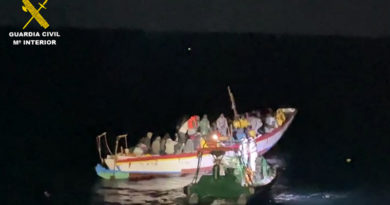Thousands flee armed group attacks in eastern DR Congo
UNHCR, the UN Refugee Agency, is rushing support to tens of thousands of people who have been recently displaced in the aftermath of brutal attacks and fighting by the armed groups in the Democratic Republic of the Congo’s North Kivu and Ituri provinces.
More than 50,000 people have fled in the aftermath of a recent upsurge in fighting in North Kivu. The displaced include an overwhelming number of children – including many who are unaccompanied by either a parent or guardian.
Brutal attacks blamed on the armed group Allied Democratic Forces (ADF) killed at least 13 people at a site hosting forcibly displaced people in Mbau village, Beni Territory, on September 21. In fear for their lives, many others fled from the nearby fields where they were working, leaving everything behind. The following day, the same armed group reportedly looted and burnt down a health clinic at Musuku village. A health practitioner and several other civilians have not been seen since September 22.
As the violence continues to affect civilians in the eastern parts of the country, there is a sense of shock, panic and fear in many areas with people anticipating more attacks and not wishing to return to their homes.
A large number of the displaced have now fled for the second time this year and have found shelter with host families in Mangina town who were already struggling to meet their own basic needs. Some have taken refuge in an overcrowded church, while others lack proper shelter and are forced to sleep in the open. Civilians are caught up in a vicious cycle of violence and displacement with no hope in sight – making the region a constant epicenter of human suffering.
To respond to the needs of those forcibly displaced and their local host communities, UNHCR, its humanitarian partners and local authorities, are providing aid, including shelter assistance, healthcare, water and sanitation and protection.
UNHCR is also assisting forcibly displaced people in Pinga, an area in North Kivu, where ongoing fighting has reached an alarming stage endangering innocent lives. Clashes following the split of different factions within the NDC/R armed group have displaced between 40,000 – 60,000 people since July.
Through a UN inter-agency mission during August in the area, and ongoing protection monitoring, UNHCR and partners have received reports of human rights violations including killings, rape and kidnappings. Over 270 children associated with armed groups were identified, and allegations of child recruitment, killings and mutilation of children, and sexual violence against children were documented. At least 54 children who were recently released by one armed group were then apparently forced to join an opposing faction in the area.
UNHCR is reinforcing its presence in the area and preparing the distribution of relief items for at least 15,000 people as well the construction of emergency shelters, and working with communities on strengthening their protection mechanisms.
In Ituri Province in the Southern Territory of Irumu, there has also been a sharp increase in violence with the emergence of a new armed group and an intensification of attacks by other armed groups and militia.
These groups all apply the same destructive methods of looting and burning houses to the ground, which makes it difficult for the displaced to return to their villages. Since July this year, over 120,000 people have been displaced by this surge of violence in the Southern Territory.
In July and August, peace consultations led by local authorities had concluded with a unanimous call to cease hostilities by all armed groups in the area. However, the efforts could not bring peace with the long-standing land disputes between different communities remaining unresolved and without a disarmament process. Armed groups have continued their attacks in September killing at least 43 people and kidnapped 17 more in the Territory.
The new displacements in North Kivu and Ituri add to the over 3.4 million persons already internally displaced in the two provinces. There are currently 5.5 million people internally displaced in the DRC, one of the largest displaced population globally and the largest in Africa.




